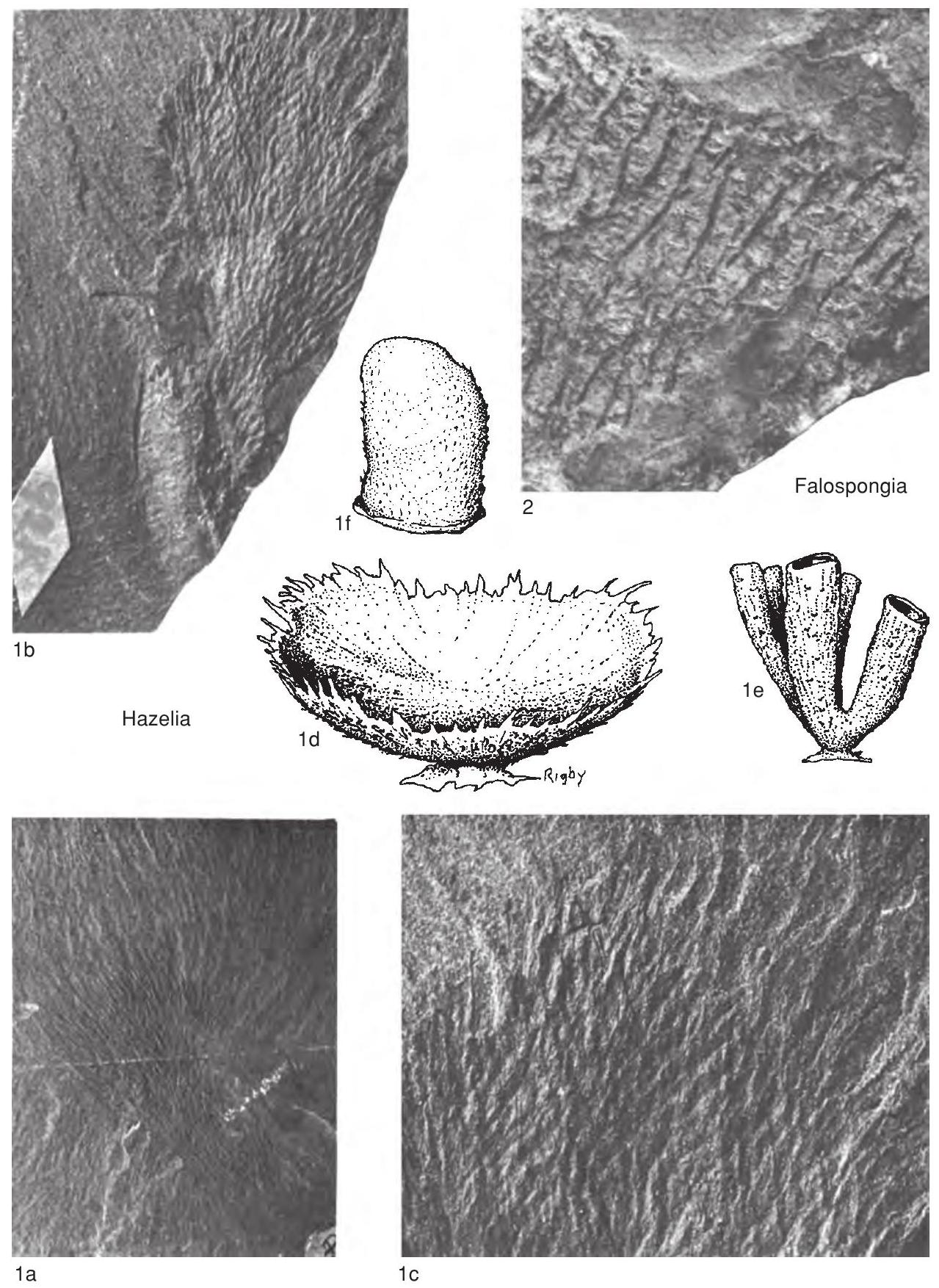Welcome to the Treatise on Invertebrate Paleontology!
Please enter a genera name to retrieve more information.

Hazelia
Classification
Phylum:
Porifera
Class:
Demospongea
Subclass:
Clavaxineddida
Order:
Protomonaxonida
Family:
Hazeliidae
Formal Genus Name and Reference:
Hazelia WALCOTT, 1920, p. 281
Type Species:
H. palmata WALCOTT, 1920, p. 282, OD
Images
(Click to enlarge in a new window)
Fig. 20, 1a-f. *H. palmata, Stephen Formation, Burgess Shale, Mount Field, British Columbia, a, lectotype, fragment of disc with ragged, tufted margin and radiating bundles of coarse oxeas, USNM 66463, X1, b, paralectotype with coarse tufts of bundled oxeas, USNM 66492, X2, c, enlarged upper of paralectotype showing two diagonally oriented series of tufts of oxeas, USNM 66492, X5, d-f, growth forms of various species of Hazelia, not to uniform scale (Rigby, 1986a).
Synonyms
Geographic Distribution
Canada (British Columbia), USA (Utah)
Age Range
Beginning Stage in Treatise Usage:
Middle Cambrian
Beginning International Stage:
Cambrian Stage 4
Fraction Up In Beginning Stage:
40
Beginning Date:
512.3
Ending Stage in Treatise Usage:
Middle Cambrian
Ending International Stage:
Guzhangian
Fraction Up In Ending Stage:
50
Ending Date:
498.75
Description
Flabellate, conical, frondescent, branching or tubular, expanding upwardly from narrow base, composed of branching and anastomosing, subparallel spiculofibers, fibers composed of plumosely arranged, smooth oxeas, canals small and parallel to fibers, a dermal layer of tangential oxeas may be present. [H. delicatula WALCOTT, which is tubular and branching and has a more nearly isodictyal net of bundles of parallel oxeas, perhaps should be placed in a separate, new genus.]
References
Walcott, C. D. 1920. Cambrian Geology and Paleontology. IV. no. 6. Middle Cambrian Spongiae. Smithsonian Miscellaneous Collections 67(6):261-364, fig. 4-10, pl. 60-90.
Museum or Author Information
Classification
Phylum:
Porifera
Class:
Demospongea
Subclass:
Clavaxineddida
Order:
Protomonaxonida
Family:
Hazeliidae
Formal Genus Name and Reference:
Hazelia WALCOTT, 1920, p. 281
Type Species:
H. palmata WALCOTT, 1920, p. 282, OD
Images
(Click to enlarge in a new window)
Fig. 20, 1a-f. *H. palmata, Stephen Formation, Burgess Shale, Mount Field, British Columbia, a, lectotype, fragment of disc with ragged, tufted margin and radiating bundles of coarse oxeas, USNM 66463, X1, b, paralectotype with coarse tufts of bundled oxeas, USNM 66492, X2, c, enlarged upper of paralectotype showing two diagonally oriented series of tufts of oxeas, USNM 66492, X5, d-f, growth forms of various species of Hazelia, not to uniform scale (Rigby, 1986a).
Synonyms
Geographic Distribution
Canada (British Columbia), USA (Utah)
Age Range
Beginning Stage in Treatise Usage:
Middle Cambrian
Beginning International Stage:
Cambrian Stage 4
Fraction Up In Beginning Stage:
40
Beginning Date:
512.3
Ending Stage in Treatise Usage:
Middle Cambrian
Ending International Stage:
Guzhangian
Fraction Up In Ending Stage:
50
Ending Date:
498.75
Description
Flabellate, conical, frondescent, branching or tubular, expanding upwardly from narrow base, composed of branching and anastomosing, subparallel spiculofibers, fibers composed of plumosely arranged, smooth oxeas, canals small and parallel to fibers, a dermal layer of tangential oxeas may be present. [H. delicatula WALCOTT, which is tubular and branching and has a more nearly isodictyal net of bundles of parallel oxeas, perhaps should be placed in a separate, new genus.]
References
Walcott, C. D. 1920. Cambrian Geology and Paleontology. IV. no. 6. Middle Cambrian Spongiae. Smithsonian Miscellaneous Collections 67(6):261-364, fig. 4-10, pl. 60-90.
